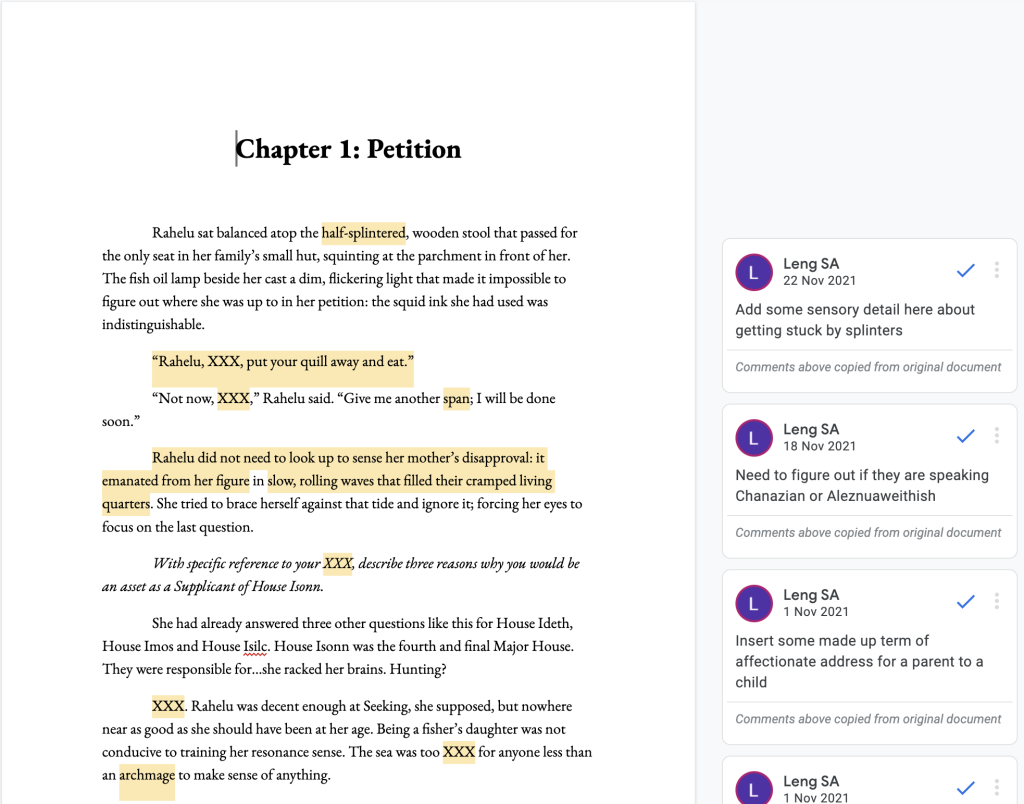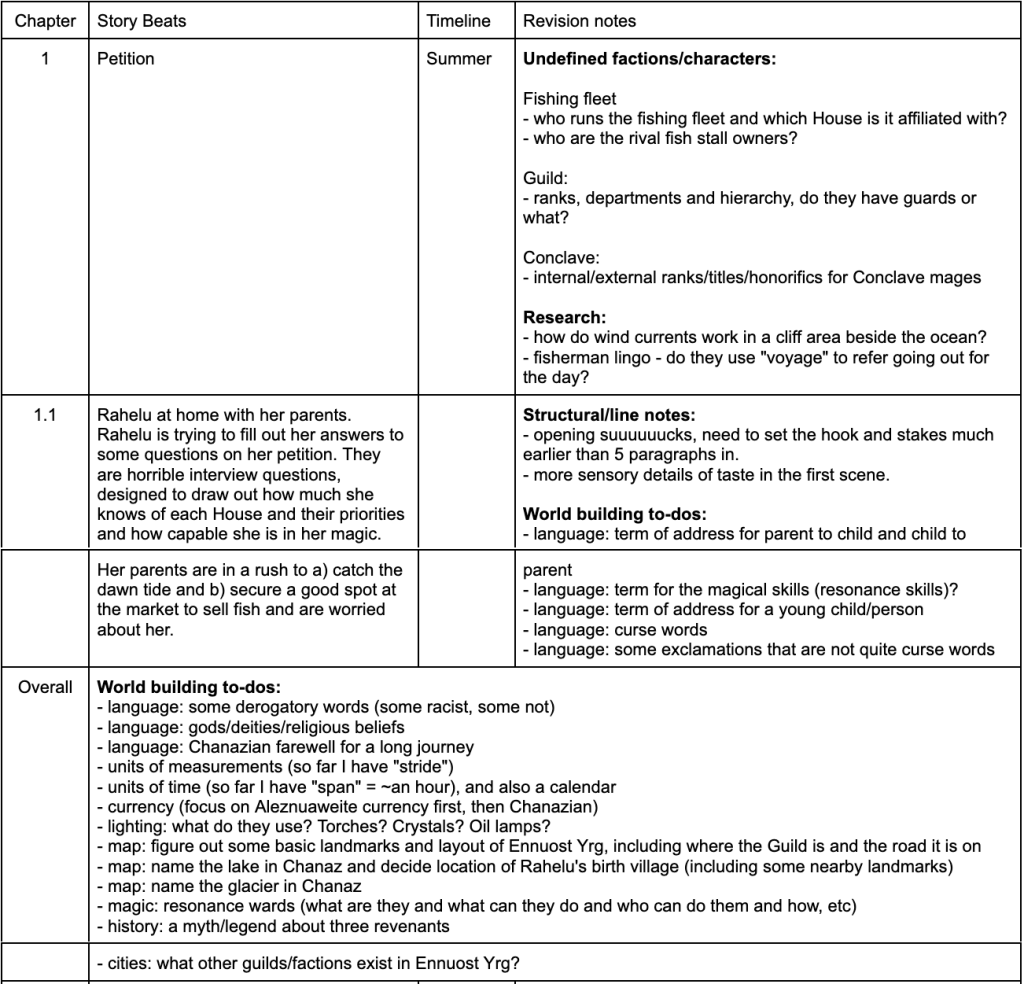This is the second-most-revised chapter in the entire book. There’s so much pressure to have a great, hooky first sentence. That pressure extends to the first paragraph, the first page, the first chapter…
(To be honest, the pressure’s there for the whole first book, and then every book that follows. Writing is hard.)
But there’s something about that first sentence that creates additional pressure. The blank page holds an endless promise: you could write the next The Lord of the Rings, the next A Song of Ice and Fire, the next Malazan Book of the Fallen, the next Stormlight Archive, the next Cradle—something that will be even better and more beloved than the works that have been immortalized in the literary canon.
And then you write your first word, and with that word, you’ve eliminated a billion possibilities. By the time you’ve written your first sentence, you realize that you’re a no-talent delusional hack who will never be able to craft anything a tenth as good as the latest trashy read you picked up from the bargain bin at a remainder store and you question your sanity for daring to have the audacity to think you might be worthy of trying.
Openings are hard to write. And they’re hard to get right. This is what my first draft looked like:

It follows roughly the same beats as the published version:
- Rahelu agonizes over her Petition, trying to put the best spin on her answers without outright lying.
- Her father reminds her to eat before he leaves for the sea.
- She spills ink on her Petition.
- Her mother scolds her for wasting food, for lacking manners, for being slow.
- It ends the same way: her mother tells her to wash and hurry so they can arrive before Hzin.
I didn’t have much of my worldbuilding done before I started, so even though it was a short (for me) scene of 1,035 words, there were a lot of XXX placeholders. I started a list:

As an opening, it’s awful and boring:
- There is no sense of who Rahelu is as a character.
- There’s conflict between Rahelu and her mother but nothing happens!
- There’s simultaneously too much exposition and not enough exposition.
- Some magic is happening but it’s not very exciting.
- The stakes are unclear and therefore uncompelling.
So I expanded the scene and tried to make it do more work. It ended up being 4,605 words long. (Here’s the tracked changes from the alpha read first draft to the beta read version.)
I made an effort to give Rahelu’s narration more individuality. (By then, I’d finished the first draft so that was easier do to.) I shoehorned in more exposition about the Houses, Rahelu’s interactions with the other trainees, her family’s immigrant journey, her prospects.
All that was fine. But what really saved the opening was the new sequence with House Isonn’s debt collectors. Without it, no matter how much Rahelu worries about money, the stakes feel abstract. But when money problems manifest directly on their doorstep with the threat of physical violence, the stakes become real and visceral.
That’s where the book starts to gain momentum. And it takes far too long to happen: not only did my beta readers have to slog through an almost 6,000-word-long prologue, they had to make it through more than 3,000 words of Rahelu reviewing her fantasy job application before House Isonn arrives on the scene.
Normal readers would have DNF’d somewhere around the first paragraph, I’m pretty sure. I needed to get them to the action as quickly as possible, to keep them hooked. For a while, I seriously considered moving all of Rahelu’s agonizing over her Petition to Chapter 2, so we could begin with the debt collection sequence. I even considered moving the whole scene to the Lowdocks proper.
I didn’t feel like that solution worked though. Something gets lost and the emotional impact is weakened, when you see that sequence play out without having seen Rahelu’s home environment, the contrast between the immigrant dream and the immigrant reality. It’s a little heavy-handed in the execution—I wish I had the skill as a writer to be more subtle about it—but showing that disjunction was important to me.
The only option left was to cut down the front-loaded exposition as much as possible. It made the apparent scope of the world much smaller, but that was a trade-off I was willing to make. (The post-beta-read version was 3,264 words long. Here’s the tracked changes version to the beta read version.)
That was still too long for my liking. During line edits and proofreading, I cut another 600 words. (Here’s the tracked changes for that.)
The final word count for this chapter stands at around 2,700 words long. It is one of the shortest chapters in the book, apart from the prologue, interlude and epilogue.
Normally, I prefer much longer chapters. Around 5,000–6,000 words is where my chapters typically sit in a first draft, with the longest ones topping out at 10,000–12,000 words. Part of this is because I’m naturally verbose; the other reason is that I conceive of chapters as short stories with a self-contained arc. For me, the difference between a scene and a chapter is that while every scene should advance plot and character and develop the world, a scene does not necessarily contain an arc.
You’ll have noticed that Chapter 1, as published, does not have an arc. This was because Chapter 1 did not originally end here. It ended at the same end point of the published Chapter 2. The last scene of the published Chapter 13 was the middle of the arc, and it originally took place in the middle of the events that now comprise Chapter 2.
It was confusing for my alpha and beta readers and set up the wrong kinds of story and character promises. I moved the middle scene closer to the midpoint of the book, which we’ll discuss when we get to the Chapter 13 annotations.
That helped, but it still left me with pacing issues. Alpha and beta readers all agreed that the book takes a while to get going. I debated my chapter breaks for weeks, but ultimately caved and broke the story into shorter chapters to help with pacing.
I think it was the right thing to do.
I’m still not sure how I feel about short chapters. Hopefully, as I improve as a writer, I’ll develop more economy with my prose and get better at constructing multi-layered scenes, so I can pack more story into the same word count.
(I realized yesterday that The Traitor Baru Cormorant is only about 140,000 words long. It blew my mind. I’ve got a long way to go as a writer.)
Leave a Reply